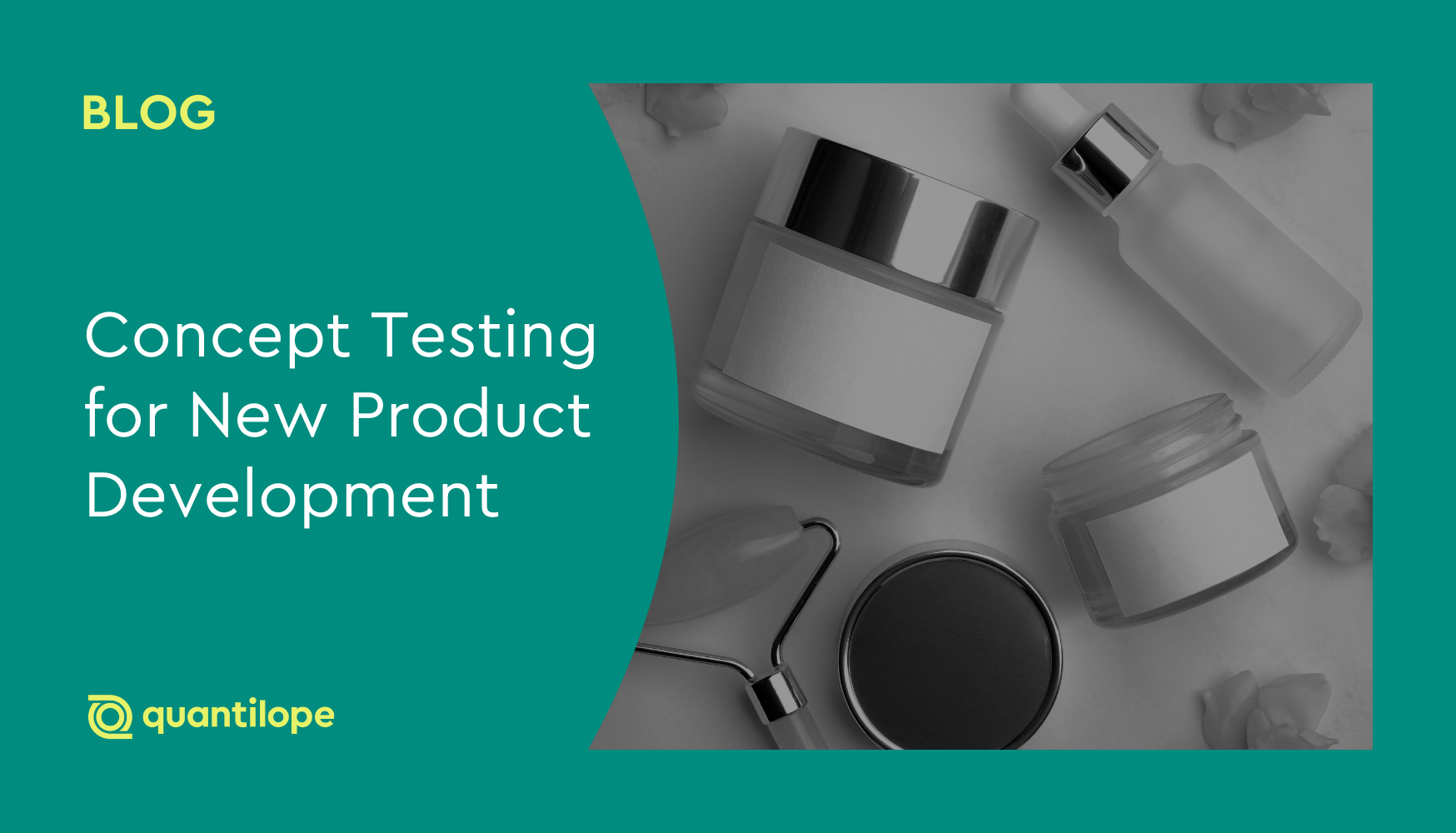Launching a new product is exciting! It shows your business is growing, expanding, and perhaps adapting to changing customer wants/needs. It can also be risky if not approached thoughtfully. Rather than taking the gamble and be left asking "Will our new product be a hit or a miss among our customer base?", minimize your risk of a product flop by investing in concept testing for new product development.
Table of Contents:
- What is concept testing?
- When to use concept testing?
- Why concept testing is essential for new product development
- Different approaches for testing concepts
- Concept testing for new product development with quantilope
What is concept testing?
Concept testing is a market research solution that allows businesses to gain feedback on new product ideas before actually investing time and resources.
In a concept test, a business will send their concept testing survey to respondents, showing them a preliminary concept – be it a description, visual mock-up, or even an early-stage prototype. To ensure your concept test is worthwhile, you’ll want to test your potential new concepts among respondents that represent your target audience (current or desired demographics for your product once it hits the shelf).
Product concept testing is a key part of a new product development process as it lets businesses know whether or not their idea is worth continuing to develop based on their audience’s gauged interest, perceived flaws, and desired product tweaks.
Back to Table of Contents
When to use concept testing?
Concept testing is a versatile tool that can be deployed at various stages in the new product development cycle. It’s valuable when businesses need to gather specific insights and answer critical questions about their product’s potential future before launch, or, to understand if products are still viable years later after they’ve been introduced.
Below are a few scenarios where concept testing is particularly useful:
- Validating early-stage ideas: When you think you have a promising product idea but want to gauge its potential before investing heavily in development, concept testing is a great solution to capture detailed, valuable metrics from your target audience.
- Refining product features and benefits: If you're unsure which new features or benefits will resonate most strongly with customers, concept testing can help you identify the most valuable aspects to prioritize.
- Identifying potential issues and concerns: Before committing to a final design, concept testing can reveal potential flaws, usability issues, or concerns that you and your team may have overlooked - and that could hinder customer adoption or satisfaction.
- Determining optimal pricing: Concept testing can help you understand consumer price sensitivity and identify the optimal price point that balances profitability and customer value.
- Optimizing marketing messages: By understanding which aspects of your concept resonate the most with potential customers, you can tailor your marketing campaign messaging to highlight those specific benefits.
In essence, concept testing is a valuable tool whenever you need to gain a deeper understanding of how your target audience perceives your product idea, what factors might influence their purchase decisions, and how it can be optimized to please the widest reach of consumers. By asking the right questions and gathering relevant feedback, you can make informed decisions to increase your chances of launching a successful product that meets the needs and expectations of your customers.
In which state of new product development is the concept tested?
As for timing, many businesses will leverage concept testing early on in the new product development cycle - after initial brainstorming but before they commit substantial resources to design and production. This is a pivotal point as it allows businesses to gather valuable feedback and make informed decisions about whether to proceed with the concept, how to refine it, and what marketing messages will resonate most effectively with their target audience. It can be thought of as a critical checkpoint in the new product development timeline to determine if your product is worth spending resources on to proceed with further development; thereby mitigating risks, validating assumptions, and ultimately increasing the likelihood of launching a successful product.
However, as mentioned above, concept testing is useful beyond just early stage development, for things like refining existing product features or optimizing new campaign messaging.
Why concept testing is essential for new product development
Concept testing in the new product development process is a strategic investment that proves its worth throughout the entire product lifecycle.
With concept testing, businesses benefit from:
Risk mitigation
Concept testing acts as a safety net. It allows you to identify potential pitfalls and shortcomings early on, when adjustments are relatively easy and inexpensive to make. By addressing these issues upfront, you significantly reduce the risk of launching a product that falls flat in the market, saving you from costly failures and damages to your reputation.
Idea validation
Great ideas often come from internal brainstorming sessions and creative discussions within your team. However, the true test of any concept ideation is how well the idea resonates with the given target audience - the ones who would actually buy the product on the shelf. Concept testing provides somewhat of a reality check, confirming whether or not your concept addresses a genuine need or desire for your target market. This validation not only reinforces your confidence in moving forward but also provides compelling support for internal buy-in and external investment.
Targeted refinement:
Rarely is a product concept perfect right out of the gate. Concept testing acts as a magnifying glass, highlighting areas where you can refine and improve your product. It helps you pinpoint specific features, benefits, or messaging statements that resonate best with your target audience, enabling you to fine-tune your offering and create a product that customers are genuinely excited about.
Time and cost savings:
Time is money, especially when it comes to new product development. You have to develop products quickly enough to keep up with pace of competition, but also want to avoid launching a product that will turn out to be a waste of resources. Concept testing helps you identify and resolve issues early on, avoiding costly delays and reworks too late in the process.
Back to Table of Contents
Different approaches for testing concepts
Knowing the benefits of concept testing for product development, below are some common ways research teams go about doing so.
- Surveys
Online quantitative surveys are cost-effective and efficient for reaching a large sample size. Through a series of survey questions, researchers can capture feedback from current and potential customers around concept appeal, purchase intent, price sensitivity, and other concept elements. An effective concept testing survey will cover many details and aspects of the new product you’re testing, often including advanced methodologies for richer insights (more on that later). By leveraging the reach and scalability of online surveys/questionnaires, businesses can base decisions on real consumer data to support the new product development process. - Focus groups
In-depth group discussions provide qualitative research insights into consumer perceptions, motivations, and potential barriers to adoption. These dynamic, interactive sessions allow researchers to ask as many follow-up questions as needed to uncover the "why" behind consumer perceptions. With focus groups, participants not only share their own thoughts but also build upon and challenge each other's perspectives. This kind of discussion can extract hidden motivations, unspoken concerns, and unexpected associations that help shape final product development and marketing strategies. - In-depth interviews:
In-depth individual interviews - while similar to focus groups in their qualitative nature, provide a unique advantage: the ability to really dive into individual experiences and explore specific perceptions. By focusing on a single participant at a time, researchers can create a safe and comfortable space for candid conversations that might be overshadowed or missed in a group setting. Researchers can even tailor and guide the discussion as it unfolds based on each participant's unique feedback. - Simulated test markets:
One of the most realistic ways to test if your new concept will be a success? Take it on a true test run. Mimic real-world purchasing scenarios with simulated test markets to observe how consumers interact with and evaluate your product. These simulations can be physical setups that resemble stores or online platforms that mimic e-commerce websites. Simulated test markets provide valuable insights into consumer shopping behaviors, purchase decisions, pain points and other potential barriers to adoption, allowing for fine-tuning of product features, marketing messages, and pricing strategies before the true product launch.
The choice of research method depends on your concept testing goals, budget, and timeline. Often, a combination of the approaches will generate the most comprehensive understanding of consumer response - perhaps starting with a quantitative online survey and following up with an in-depth focus group (or vice versa).
Back to Table of Contents
Concept testing for new product development with quantilope
By now you know concept testing in new product development is not just a nice-to-have, but necessary to safeguard your business’ resources and product launch success.
quantilope’s Consumer Intelligence Platform automates the concept testing process through customizable survey templates, automated advanced methods, and its AI co-pilot: quinn. With quantilope, choose from a number of concept testing methods such as an A/B test, Choice-Based Conjoint analysis, or MaxDiff analysis. Often, researchers opt for quantilope’s monadic A/B test methodology for concept testing - which shows respondents a single concept in isolation, without the comparison or influence of other options. This allows for unbiased feedback on the specific concept's appeal, perceived value, and potential purchase intent.
With quantilope’s end-to-end platform, build your concept testing survey from scratch using drag & drop modules or start with a customizable survey template. Choose your advanced methods, connect to your target audience through any panel of your choice (quantilope is panel agnostic), and monitor responses in real-time. As you build your charts and add them to your dashboard, quantilope’s AI co-pilot, quinn, can suggest chart headlines and dashboard summaries that highlight the most actionable insights for key stakeholders.
The new product development process can feel daunting and overwhelming if you don’t have the right concept testing tools. With quantilope, you won’t be left guessing whether or not you asked the right questions or included the right methods. Your dedicated research consultant (along with quinn!) will support your entire concept testing initiative from start to finish, ensuring actionable insights you feel confident about.
To learn more about quantilope’s Consumer Intelligence Platform and concept testing solution, get in touch below!



.png)
